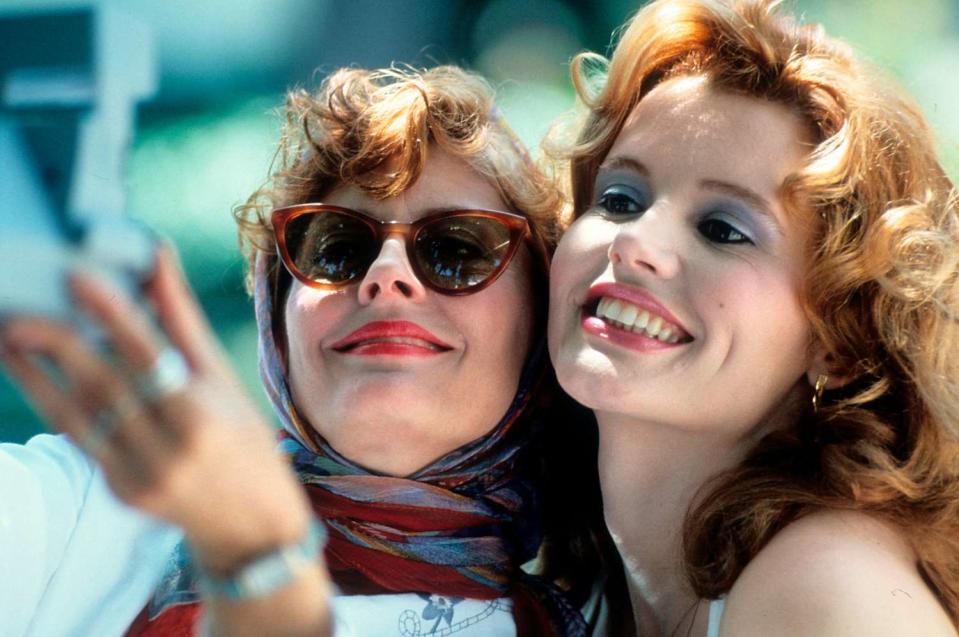Geena Davis Says Hollywood Hasn’t Changed Much for Women Since She Did Thelma & Louise in 1991

Geena Davis has headlined some of the most progressively female-centric films of all-time, including Thelma & Louise and A League of Their Own — but the Oscar winner says Hollywood did not change much for women until only very recently.
When Davis, 64, began her acting career in the 1980s (with early appearances on TV’s Family Ties and in classic films like Tootsie, Fletch and The Fly), she recalls feeling optimistic that sexism and ageism were diminishing, and leading ladies were emerging from a long history of second-class status in Hollywood.
Watch the full episode of People Features: Geena Davis streaming now on PeopleTV.com, or download the PeopleTV app on your favorite device
“When I first started out, was a time when every year at the Oscars Meryl Streep, Jessica Lange, Glenn Close and Sally Field were nominated for these incredible movies starring them and getting awards,” Davis tells PEOPLE in this week’s issue. “I’d heard the concept that women over 40 don’t work, but I thought ‘They’re changing everything. This is how it’s going to be, and I won’t have to worry about anything.’ And that didn’t turn out to be true. It didn’t really change anything.”
As Davis’ star began to ascend with memorable projects including Beetlejuice, she felt that confidence in change waning, even and after winning an Academy Award in 1989 for The Accidental Tourist.
For more about Davis, pick up this week’s issue of PEOPLE, on newsstands Friday.

Metro-Goldwyn-Mayer/Getty Thelma & Louise
“Winning the Oscar… makes you feel incredible and appreciated,” she says. “But I don’t know that it changes your career. I really don’t know if anybody hired me because of the Oscar after that.”
“But I was getting some really good parts, interesting parts,” she adds — particularly when she was paired with Susan Sarandon in 1991’s Thelma & Louise, a feminist empowerment tale that struck a powerful chord among audiences. “When Thelma & Louise came out and we saw the reaction to that movie, it was mind-blowing what a nerve it struck. And all the press said, ‘This changes everything! Now we’re going to see so many movies with women.’ And I was like ‘Hot dog — I’m going to be in a movie that changes everything.’ ”
But instead, the film only briefly opened new doors for women in Hollywood and the kind of product the male-dominated industry was willing to make, despite the enthusiastic response. A cycle of rising and falling hopes followed, for decades.

Magdalena Wosinska Geena Davis
“My very next movie was A League of Their Own, where they said the same thing: ‘A giant hit with women playing sports — we’re going to see so many more female sports movies,’ and none of that happened,” Davis recalls. “And I kept waiting for it to happen.”
“Some other movie would come along and do really well: First Wives Club did really well, and I thought, ‘Okay, well, now… ‘” she remembers. “And the numbers have never moved. And in fact, the ratio of male to female characters on screen in films has been exactly the same since 1946.”
But today, thanks in no small part to the statistical research conducted and shared with film studios and TV networks by the Geena Davis Institute on Gender In Media, which she founded in 2004, she’s finally seeing a rising trend of better roles for women in Hollywood, in front of and behind the camera.
“It finally has happened,” she says. “We have just found, both that in kids’ TV and kids’ movies, we’ve reached gender parity with the lead characters — which is historic, it’s never happened. It’s been decades and decades where it was two-to-one, and now it’s equal. But there’s still a lot of work to do in the supporting characters, in the group scenes and crowd scenes, still very limited number of female characters.”
Today, though she still has an active acting career (she recently had a recurring stint on Netflix’s wrestling comedy GLOW), much of Davis’ time is filed presenting information to Hollywood executives and creators in an effort to keep the improvements coming.
“My simplest advice to creators is: whatever you’re already going to make, before you cast it and before you shoot it, just go through it and see if there’s any characters that can become female — or any type of diversity — and change the first name.”
“That’s a fabulous way to make it gender-balanced,” she says. “That’s one of the reasons we’re having so many more female characters now.”
And maybe, she hopes, a juicy gender-reversed role or two will pop up for her.
“So far it has not benefited me personally,” she laughs. “I made a point of saying change the characters to female, and then cast me. Because I don’t really see any reason why all of this effort shouldn’t benefit me directly!”

